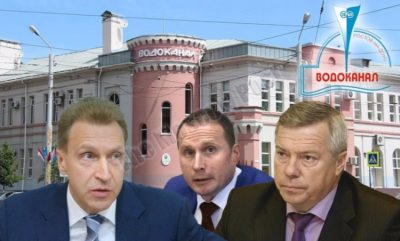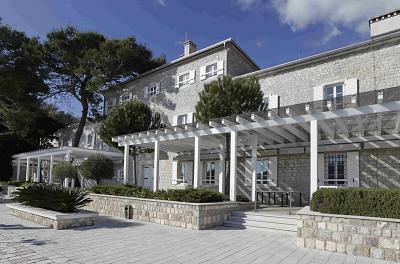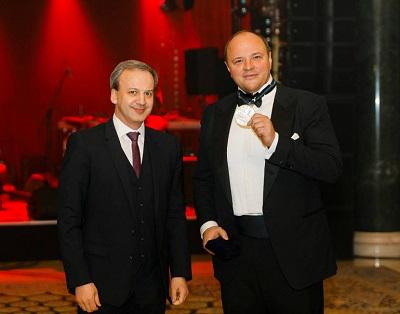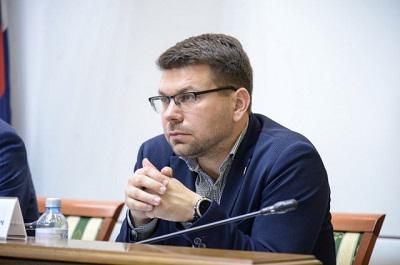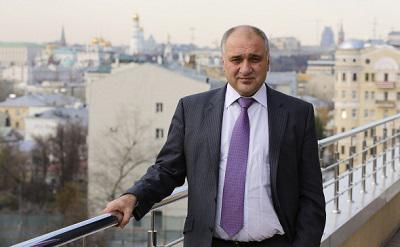Did the governor Vasily Golubev and the head of VEB.RF Igor Shuvalov both have an interest in the profits of Rostov's Vodokanal?
.jpg?v1659360636)
A conflict has arisen in Rostov-on-Don regarding JSC Rostovvodokanal, a company that handles water supply and disposal in the region. The ex-leader of the company, Dmitry Kubrak, has been sentenced to 3.5 years in prison by a local court.
Kubrak was found guilty of fraud for using bonuses intended for two Vodokanal employees to help the Svetlitsky brothers, who are seen as beneficiaries of the company, and keeping the money for himself.
The Moscow Post correspondent in the Rostov region investigated the situation surrounding a valuable asset.
Rostovvodokanal has been a highly profitable asset since it was privatized in 2005, generating revenue of 6.7 billion rubles and a net profit of 1.2 billion rubles over 15 years.
The company has secured government contracts worth 4.7 billion rubles as a supplier and 9.8 billion rubles as a customer. There is a lot at stake.
Rostov-on-Don's Vodokanal is mostly owned by Eurasian JSC with the city administration holding a 25% share.
The company was privatized in 2005, with Eurasian JSC acquiring a 75% stake despite the original plan being a concession. It seems the local authorities regret losing a significant portion of the asset.
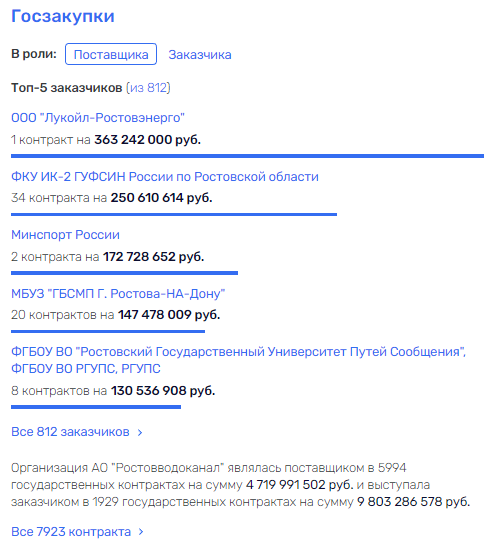
A photo: Rusprofile.en
Following the Kubrak scandal last November, Rostov region governor Vasily Golubev notably backed the idea of privatizing the city's 25% stake. The city administration, led by Golubev ally Alexei Logvinenko, had proposed the same earlier.
Both officials had previously rejected the idea of reclaiming Vodokanal shares for the city, which could have resolved many issues. It begs the question if there is a plan to transfer the shares of former Eurasian JSC co-owner Stanislav Svetlitsky to certain individuals.
Trouble for Svetlitsky.
The Kubrak case is scandalous and appears murky. Attention was drawn in 2016 with the arrest of Stanislav Svetlitsky, an alleged beneficiary of Eurasian JSC, which has a 75% stake in Rostovvodokanal and is a co-owner of Narodny Kredit bank. In 2021, Svetlitsky received a 12-year sentence for bank fund embezzlement totalling 7.7 billion rubles.
Furthermore, Stanislav's brother George, who chaired the Board of Directors of Eurasian JSC, also faced investigation for attempting to legitimize around 100 million rubles of illicitly acquired funds, likely linked to Rostovodokanal's funds.
The Svetlitskys may no longer be involved. There were rumors that Svetlitsky could still control the business from prison. Svetlitsky used to be a top manager at Rostovvodokanal and also a Deputy Minister of Energy in Russia when Igor Shuvalov was Deputy Prime Minister. Shuvalov seems to be an important player in this story.
RBC reports that VEB.RF, led by Igor Shuvalov, owns 6.19% of Eurasian JSC. Where Shuvalov is, his family's assets are also involved, along with obvious commercial interests.
VEB.RF has been acquiring struggling assets, including large state corporations like the Prosveshchenie publishing house. It's possible that VEB has plans for Rostov Vodokanal as well. The former subordinate of Shuvalov, Sergei Kotlyarenko, and his funds may also be involved in transferring control of the asset to the Shuvalov family.
What if this arrangement suits the administration of Rostov-on-Don, led by Alexei Logvinenko, the regional head Vasily Golubev, and Mr. Shuvalov himself?
VEB.RF has a minority stake in Eurasian JSC, so they need operational control over the enterprise to carry out these plans.
The majority stake is owned by the offshore Lareli Holdings ltd. Director General of Eurasian, German Vishnevsky, claims that the offshore beneficiary is Stanislav Svetlitsky, who aims to remove Vishnevsky, appoint a loyal person, and withdraw Vodokanal's assets. This is reported by “City N”.
It's an interesting theory. Eurasian JSC had no revenue in 2021, but there's a contract from 2017 for nearly 30 million rubles, when Svetlitsky was supposedly in control. It was with Rostovvodokanal JSC. How can a company co-owning a state asset also be its supplier for tens of millions of rubles?
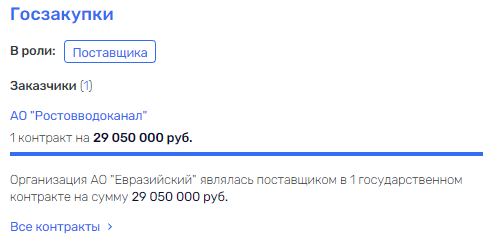
A photo: Rusprofile.en
Even without offshore holdings, Svetlitsky was supposed to have shares. After Svetlitsky's conviction, his shares were seized to pay the state. The administration of Rostov, led by Alexei Logvinenko, mentioned that the city could regain control of the water utility. However, they later abandoned this plan.
Apparently, by a “loyal face,” Mr. Vishnevsky means Dmitry Kubrak, who was appointed to the enterprise in October 2021. Vishnevsky, who also heads the Board of Directors of Rostovvodokanal, opposed this appointment.
It was Vishnevsky who initiated a change in management, but a statement on the Eurasian website announced the dismissal of Vishnevsky and confirmed Dmitry Kubrak as the current director.
However, Vishnevsky claimed he was not ousted and instead installed a new director, Mikhail Porksheev. This information was reported by the publication “161.ru”.
It is still unknown how information about Kubrak’s actions appeared and disappeared on the site. Kubrak himself soon came under scrutiny. He may have been implicated in transferring small amounts from top managers to his incarcerated boss.
Kubrak might have genuinely wanted to move assets, possibly in the interests of Svetlitsky. If so, it wouldn't be a small matter – billions of dollars are at stake. This led to a conspiracy theory suggesting that Kubrak could have been framed by another party to push the Svetlitskys out of the game and smoothly hand the decision on the enterprise's privatization to third parties.
This theory is supported by the fact that the Rostov-on-Don administration backed Vishnevsky's candidacy for the position of head of the board of directors of Rostovvodokanal. It was through Vishnevsky that Kubrak was effectively removed from the company's leadership.
Following a court's decision to hold a new shareholders' meeting, Vishnevsky retained his position as the head of the Council, and his protege Porksheev became the general director. Porksheev continues to serve as the CEO of the company.
As for Kubrak, he resisted until the end, deeming his dismissal unlawful and even barricading himself in the company's office for a month. Eventually, local riot police had to remove him under house arrest.
Even then, Kubrak claimed that the events constituted an attempt at a hostile takeover of the enterprise. However, he did not specify whose interests were at play. This view is endorsed by the chairman of the board of directors of Eurasian Svetlana Svetlitskaya, as reported by “Kommersant”. https://www.kommersant.ru/doc/5119363
So, what's the bottom line? Mr. Svetlitsky, who is being depicted as the main beneficiary of the Virginia offshore Lareli Holdings ltd, is in prison. The offshore company owns a significant portion of Eurasian JSC, where a potential relative of Svetlitsky serves as the head of the Board of Directors. Kubrak, who was considered their ally, has also been sentenced. Furthermore, the company's shares that were supposed to belong to Svetlitsky are set to be auctioned.
Meanwhile, Igor Shuvalov's VEB.RF is a minority shareholder of Evraziysky JSC. The governor of the Rostov region and the head of the regional capital's administration favor finding an investor for Evraziysky's shares.
Could these individuals have orchestrated a change in leadership at Rostovvodokanal if they had an interest? Did they deceive both Svetlitsky and Kubrak? Law enforcement agencies need to delve into this matter.
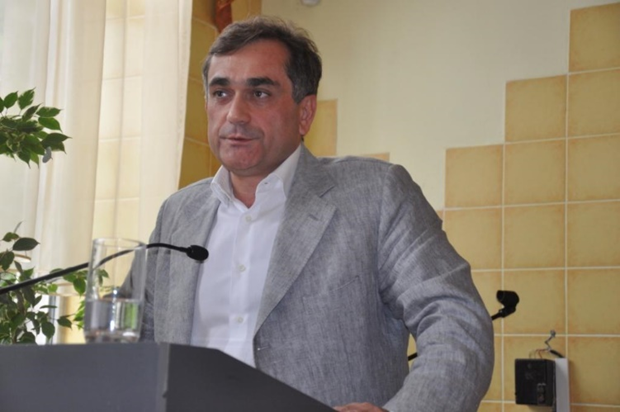
Did individuals from the team of Governor Vasily Golubev desire Stanislav Svetlitsky's assets? A photo: nvdaily.en
At present, it's still unclear which package will be put up for auction and the auction itself has not been announced. The true beneficiary of this situation can only be determined after the results are known. The person or company who receives Stanislav Svetlitsky's shares will likely be connected to Igor Shuvalov or Vasily Golubev.
